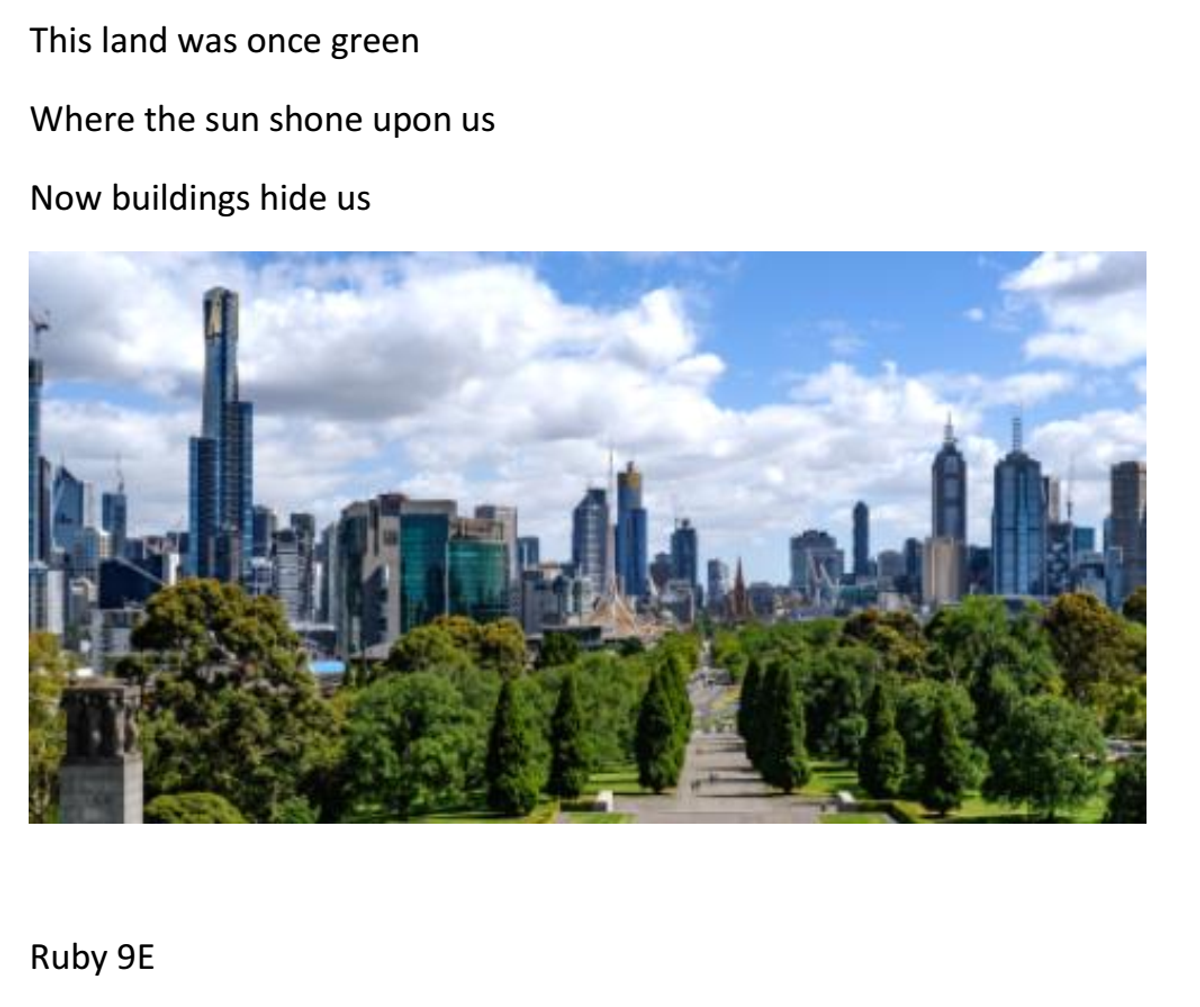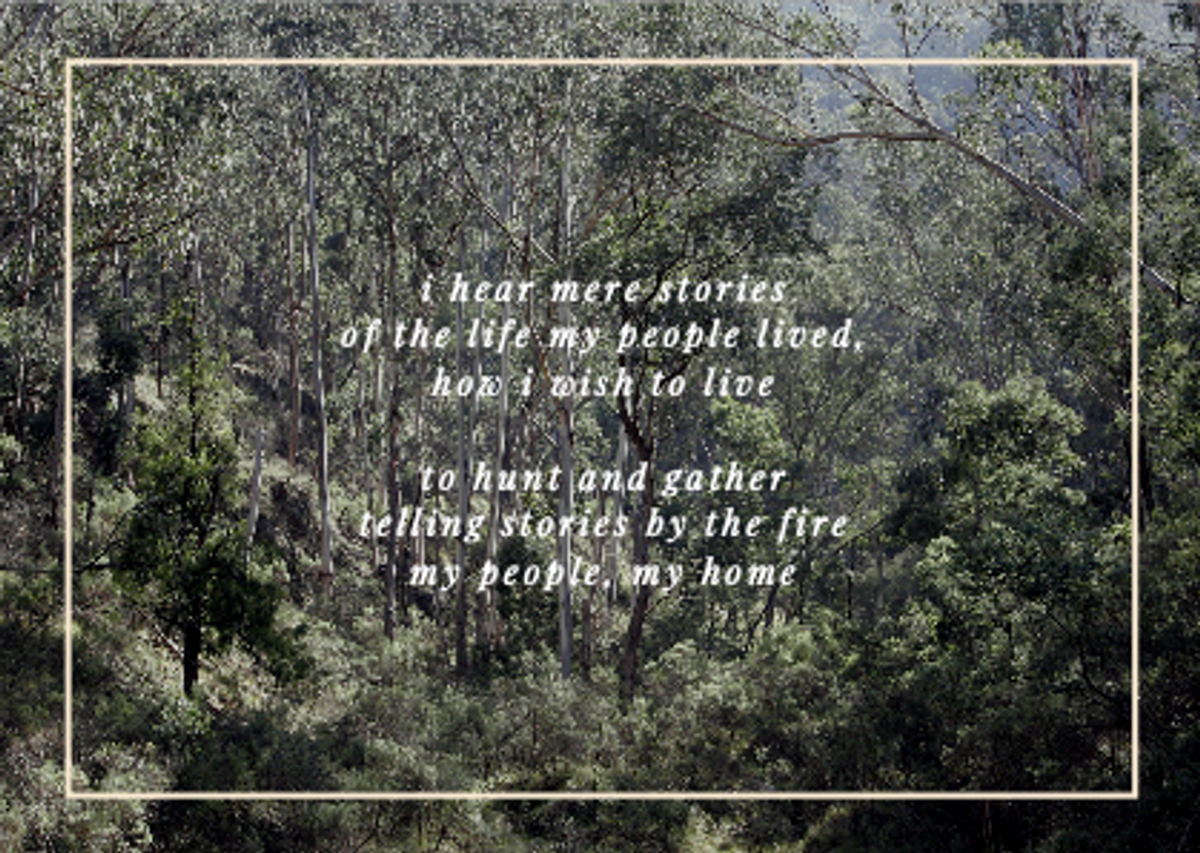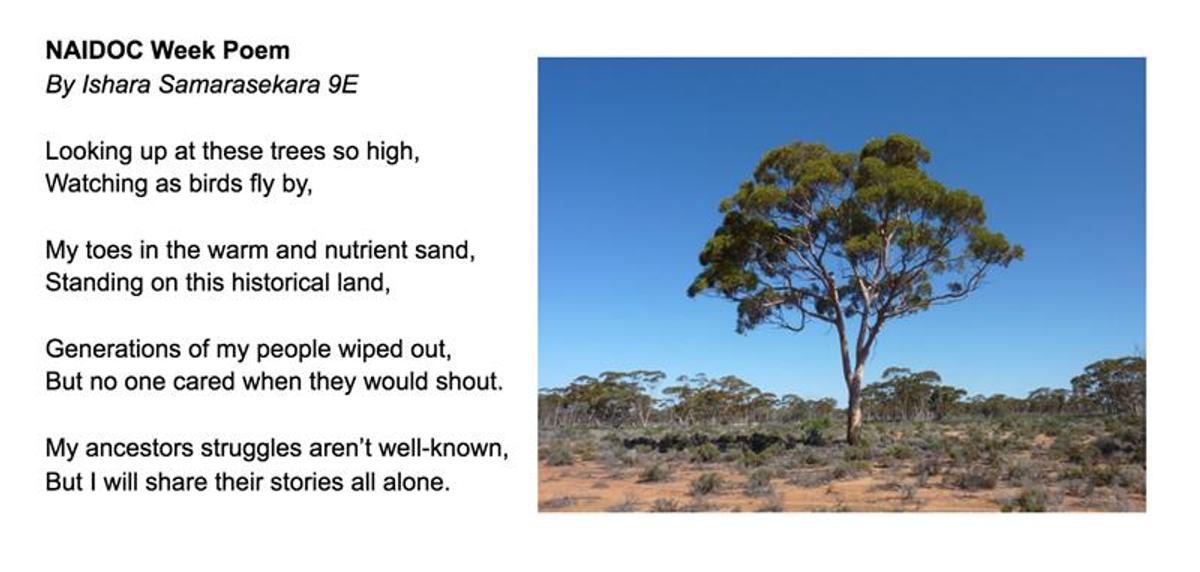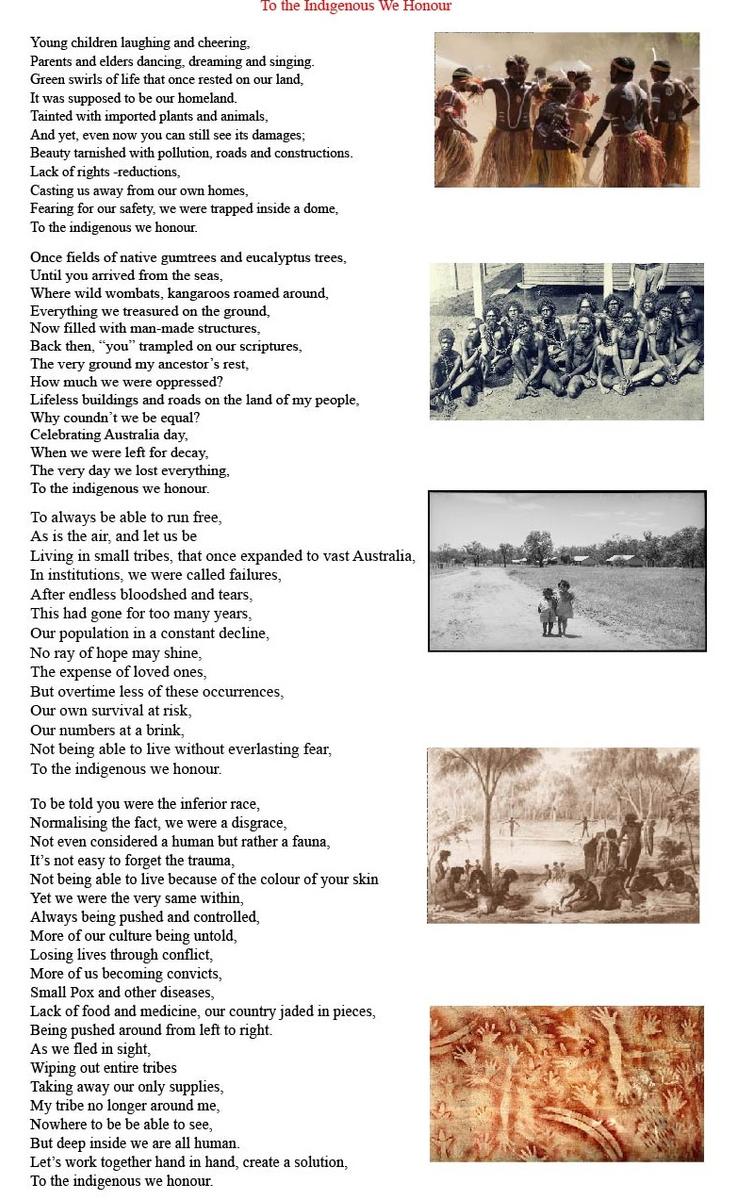Naidoc Week
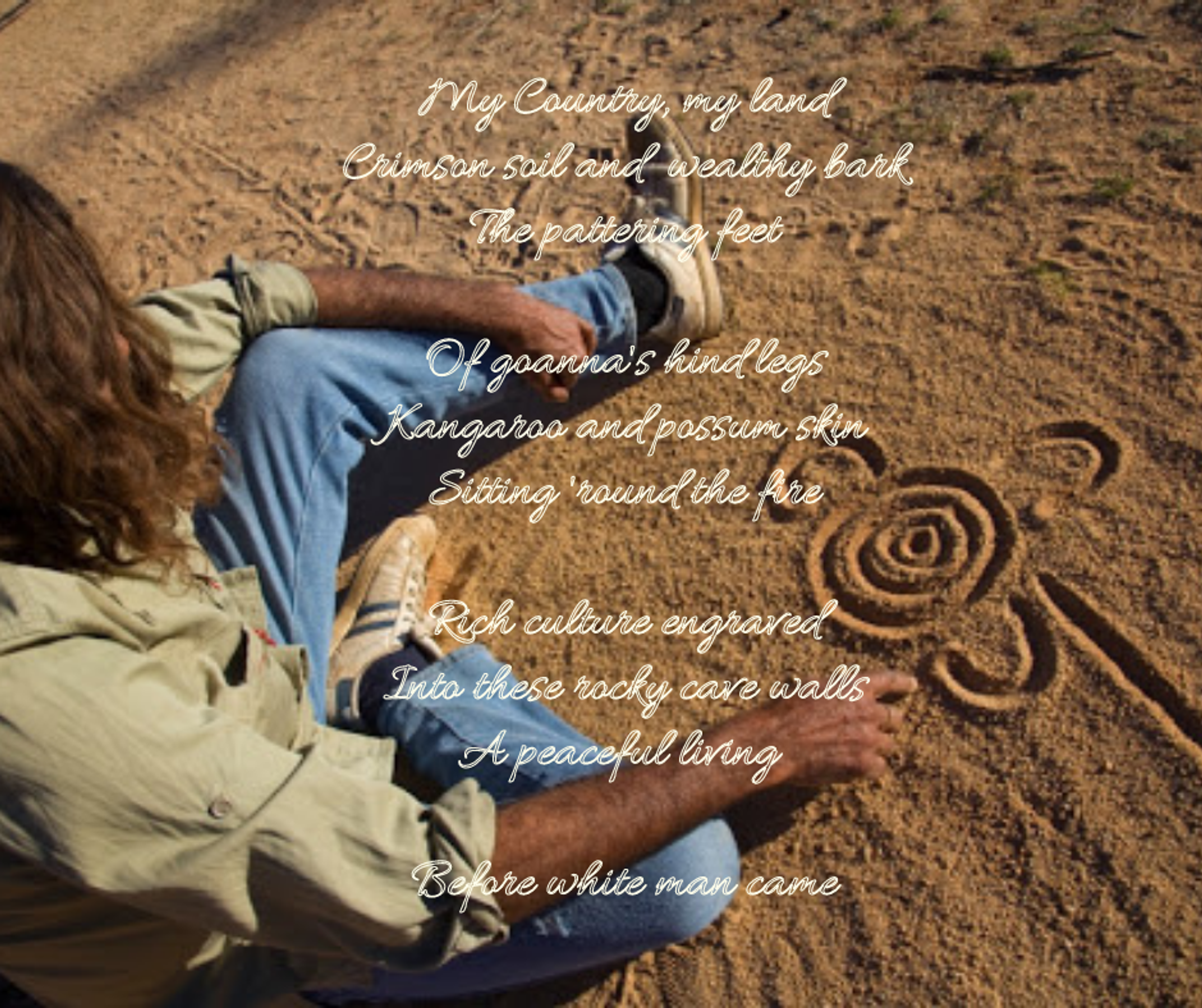
Mrs Mouzakis 9E English class reponses to NAIDOC week.
NAIDOC Week English Poem
Passing by the nature as I stride,
My heart filling with pride,
Beauty under every inch of land,
Hidden below the grass and sand
We resist as our land is taken away,
We never thought that they would betray,
This land is how we survive,
It keeps us healthy and alive
They will not take away our land,
We will make them understand,
These lands are spiritual and sacred,
And they will not be stolen due to pure hatred
Ananya 9E
these concrete towers
suffocating mother earth
when will she be freed?
Aaron 9E
Mother
You are my Mother,
My mother the Land
Our people weep today
Our hearts, they weep of dismay
The sunless skies are gray.
Please take me back
My mother the Land
Back to the enchantment of night
around camp firelight
When we sang
We laughed
We danced
We cried.
Please take me back
My mother the Land
To your beautiful plains
Your inland rains
Your rivers raging
Your creatures roaming
Your majestic mountains reaching
Reaching
For the skies.
You are my mother,
my mother the Land
You provide me
Love me
For thousands of years
But now your soul,
Like a rock waterhole
Is drenched
Not from water
But tears.
Belle
NAIDOC week haiku
It has been so long
I recall when this was ours
Yet so much has changed
Blake 9E
NAIDOC Reflection
The great wooden beast sways gently, back and forth. The wind blows across his face, bringing the scent of the sand and strange leaves, colliding with the salty sea air, the sharp wooden deck, the noxious gunpowder. The officer leans on his musket, casting his gaze round at the collection of dejected men slumped around on the benches. Petty criminals, all, not knowing when they stole that piece of bread they would be travelling out of the world to a land untouched, uninhabited, Terra Nullius, according to the navigator. Not all had made the whole way, succumbing to sickness. The officer’s grim faced, red-clad compatriots keep a watchful eye on the crowd, in between glancing out at the slowly approaching land. The fuzzy space in front of the ship is clear of housing and human impact. A shout comes from behind. One of the soldiers has stood up, and is gesturing frantically to the shore. The officer looks. At first he merely sees dark shapes moving on the beach, but as the fog drifts away they resolve themselves into humanoid figures, standing, watching the ships approach. They see them coming, the giant wooden beasts. They don’t know what to think, what to expect, the suffering that the ships bring. But the officer knows. He sees the people who live on the beach, and he sees his comrades loading their rifles, tightening their grips on the triggers, staring fearfully at the humans on the beach, and gets a sick, sinking feeling in his stomach.
Jack 9E
What an odd country we live in.
A world defined by its strange seasons and bizarre animals.
A place where the past is both deep underground and bubbling at the surface.
Do we belong here? I don’t think I can answer that question.
We don’t, really, because have my ancestors not brought trauma and loss to this land?
I could not tell you.
But it is likely that one of them has, and so it should not be within my right to call this my home.
And yet it is.
Australia is my home because I was born here, I have not left here, I will find my own family here and I can tell you that the place my ancestors came from? That is not my home.
So am I allowed to say that I belong here?
I don’t, so I’m not, but if we had the chance to leave? Would we take it? Would we return to the birthplace of the families that have been slowly intertwined to make my own?
We wouldn’t.
So do we sit, in between, in limbo, in the places that we supposedly belong?
I suppose that we must.
For this is the land where people and animals and plants and languages are long gone and yet barely distant.
Where the colours of culture combine to make a world that we claim that is ours.
I don’t know if it is.
Luella 9E
The earth beneath my feet is quiet. But, they say, listen closely. You will hear it sing. Softly, softly, the notes will quaver, sound wavering like water across the land. And, like water, it holds memories, stories of those long lost to the flood of the past. Listen to them. These stories; they tell of the world when it was born. A world where it was wild. And this wild was a blessing, a gift to the earth itself, and those who inhabited it. And the songs rang freely then, loud and beautiful and true.
But no longer.
Now, the songs are but a whisper, as the soul of a forgotten world grieves the aching loss of itself.
Siobhan 9E
NAIDOC Week
It’s not unknown that the Indigenous people of Australia have had their fair share of struggles throughout history. As European settlers came and claimed Australia, the Indigenous population bore the brunt for generations to come.
There have been many movements in relation to this grim time in Australia’s history; notably a Sydney protest in 1938 which addressed the overall treatment of Aboriginal Australians and Torre Strait Islanders. This day soon became known annually as the Day of Mourning, as well as Aborigines Day. In 1955, NAIDOC week was added to the overall event.
NAIDOC week celebrates achievements of the Indigenous population around Australia. There are awards, celebrations and activities throughout the week which Australians from all backgrounds are welcome to join in with. It’s a great, inclusive time for education and commemoration across a country that has changed so much, yet still remembers how Australia once was, along with the culture it continues to hold amongst the numerous other cultures that make up Australia.
Talia 9E
"NAIDOC Week celebrations are held across Australia each year to celebrate the history, culture and achievements of Aboriginal and Torres Strait Islander peoples.
NAIDOC is celebrated not only in Indigenous communities, but by Australians from all walks of life. This year’s theme is Always Was, Always Will Be.
According to the NAIDOC website, the theme serves as an essential reminder that 'First Nations people have occupied and have cared for this Land for over 60,000 years.'
We are working and learning on unceded Land of the Wurundjeri people of the Kulin Nations here at Viewbank College.
NAIDOC week can provide us with opportunities to talk with friends, family members, teachers and other members of your community about the ways in which we can acknowledge and reflect this in our lives. For more information, please visit https://www.naidoc.org.au/about/naidoc-week"

